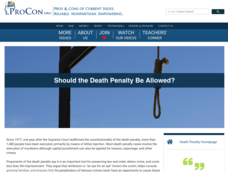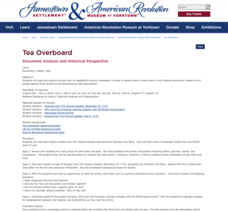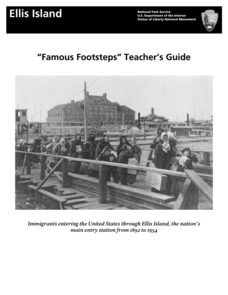ProCon
Gun Control
According to some estimates, there are more guns than people in the United States. Learners decide if America should enact more gun control laws. They analyze information about gun deaths in the United States by year, read about the...
ProCon
Gold Standard
If all the mined gold in the world was melted across a football field, it would rise 5.4 feet. That's just one interesting fact pupils learn when using the debate topics website to determine if the United States should return to a gold...
ProCon
Illegal Immigration
Should immigrants who illegally reside in the United States be eligible for citizenship? With information about undocumented immigrant population estimates, sanctuary cities, and unaccompanied immigrant children, pupils consider the pros...
ProCon
Gay Marriage
The first legal gay marriage in the United States occurred in Massachusetts in 2004. Since then, countless others have tied the knot. Scholars decide whether gay marriage should be legal by reading a history of the issue, analyzing the...
ProCon
Fighting in Hockey
At best, fighting in hockey makes the sport more entertaining; at worst, fighting could lead to death. Pupils read background information about the prevalence of fighting in hockey since the 1917 formation of the National Hockey League....
ProCon
Electoral College
The Electoral College's role in elections is sometimes confusing and controversial. Pupils use a debate topics website to research the pros and cons of the practice to debate whether the United States should still use the Electoral...
ProCon
Euthanasia and Assisted Suicide
Should physician-assisted suicide be legal? Using a debate topics website, pupils prepare to discuss the morality and legality of euthanasia. Scholars discover historical case studies involving assisted suicide, explore state-by-state...
ProCon
Drug Use in Sports
The ancient Greeks used performance enhancing drugs, such as opium juice, when they participated in the original Olympic Games. Pupils research a website with debate topics to decide if athletes' use of such drugs in modern sports is...
ProCon
Drone Strikes Overseas
Should the United States continue the practice of using drone strikes abroad? Readers explore the top pro and con arguments in preparation for a debate or discussion about the topic. They read about the history of drone strikes, view a...
ProCon
Drinking Age
Eighteen is the age of adulthood in the United States, but 21 is the legal drinking age. Pupils use the provided website to determine whether the age to legally purchase and consume alcohol should be lowered. They weigh the pros and...
ProCon
Death Penalty
Should the United States continue the practice of capital punishment? Scholars set out to answer the question in preparation for a class debate or discussion about the death penalty. They watch videos, analyze charts about death penalty...
ProCon
Daylight Savings Time
An entomologist named Geroge Vernon Hudson is credited with proposing Daylight Saving Time (DST) so he could better study his insects. Using the informative website, scholars read a brief introduction to the topic and then explore the...
National Endowment for the Humanities
Revolution '67, Lesson 2: What Happened in July 1967? How Do We Know?
Even in a world in which dozens of participants and curious onlookers record every controversial event, the basic facts of what happened are often in dispute. Revolution '67, Lesson 2 explores 1967 Newark, New Jersey using an examination...
National Endowment for the Humanities
Revolution '67, Lesson 1: Protest: Why and How
To some people, protesting is as American as apple pie, but the factors that lead to protests can be as confusing to veteran activists as to today's youth. Revolution '67 explores the riots in Newark, New Jersey as a case study. Using...
Jamestown-Yorktown Foundation
Why Did Some Colonial Virginians Seek Independence?
To understand the reasonings of those colonials who sought independence from England, young historians are divided into content groups that examine documents related to either the Boston Tea Party, the Yorktown Tea Party, Tea Overboard,...
K20 LEARN
Diversity Quilt: A Lesson on Culture
After brainstorming the various aspects of cultural identity, class members interview each other, examine video clips, and read stories to discover how these aspects reveal one's cultural identity. Individuals then craft a quilt square...
PBS
“He Named Me Malala”: Understanding Student Activism Through Film
Malala Yousafzai has become the face of social activism. After watching He Named Me Malala and short student-made films about what young people can do to become instruments of change, class members reflect on what it means to be an...
ConnectED
Crime Scene Investigation
How exactly does a crime scene investigation work? The resource, a unit on criminology, covers everything from the deductive reasoning skills needed for detectives to DNA fingerprinting, all the way to how to gather evidence and bring...
Jamestown-Yorktown Foundation
Tea Overboard
While less well known than the event in Boston, the Yorktown Tea Party was equally decisive in turning community sentiment against Great Britain. To gain an understanding of why the colonists objected to the Tea Act, young historians...
Jamestown-Yorktown Foundation
Life of a Private Lesson Plan
In order to understand the challenges the Continental Army faced during the American Revolution, class members analyze primary source materials including a soldier's journal and an officer's letter, and watch a short reenactment video.
Jamestown-Yorktown Foundation
Making a Patriot Inquiry: Are Independence, Freedom, and Liberty the Same Thing?
As part of a study of the American Revolution, class members engage in an inquiry-based lesson that has them watch a scene from the play Slave Spy, examine multiple primary source documents, and then discuss the similarities and...
Jamestown-Yorktown Foundation
How Did Relations between Britain and the Colonies Change after the French and Indian War?
What does the French and Indian War have to do with the American Revolution? Following the war, Britain issued the Proclamation of 1763 in an attempt to limit the colonists' western expansion. To understand how the proclamation, the...
Jamestown-Yorktown Foundation
Why Did Some Colonial Virginians Continue to Support the King?
Not all colonials supported the American Revolution. A resource from the American Revolution Museum at Yorktown ask young historians to investigate the reasons why some colonial Virginians were loyalist and continued to support King...
National Park Service
“Famous Footsteps” Teacher’s Guide
As part of a study of Ellis Island Immigration Station, class members assume the role of immigration service workers, investigate the dossier of an immigrant, and recommend whether or not their subject should be allowed to enter the US....

























